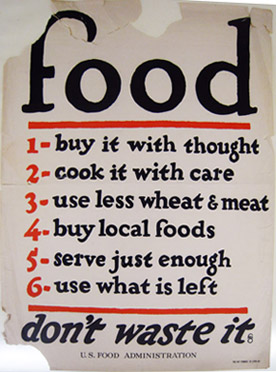This poster from 1917 is just as relevant today.
In the midst of economic uncertainty, it is important to conserve our hard earned money, and to learn to spend it wisely. The recent governmental regulations have made a bit of a dent in our single-income paycheck, as is true for many ,many Americans. One of my hopes for this blog is to give other families a sense of peace in tough economic times. There is much we can do to alleviate the pinch of tightening home budgets.
This month I want to focus on home-made alternatives to common store bought items, as well as stocking up the pantry, something that seems to almost be a thing of the past in a society where we can get nearly anything we want, right up the street at the store.
But for now, some timeless tips on how to live frugally with food:
1. Buy it with thought
A great home-cooked meal doesn't have to be a fancy four-course feast. But it does take some planning. Making a meal plan a few days before you go to the store is a good start to feeding your family well on a budget. Make a note of what you have already at home. Also, think about where the things on your list are coming from, what is in them, and if you could possibly make them yourself. And see if you could buy it in bulk, or at least a few at a time-that way you can start building up a supply and have it on hand the next time you need it.
2. Cook it with care
My husband hunts and we have been able to supplement our meat supply with deer. I was skeptical at first, but I have found that deer meat ( or rather 2/3 deer, 1/3 beef for fat) does not taste any different at all than ground beef. I use deer meat for all our meat dishes except for burgers and meatloaf because those things need a little more fat to hold together. Each package of deer meat is 1 pound, and I always try to save at least 1/2 of the cooked meat for another meal later in the week. And it freezes well, just like ground beef. This way we can get 2 or sometimes even 3 meals from just one package.
\. Since my husband takes his dinner to work with him, and we are making it a rule not to eat out, I know he is going to need a dinner every night during the work week. Most nights I will make dinner for me and the kids, with the intention that he will take the leftovers for his dinner the next night. But sometimes for whatever reason, it works out that there are no leftovers to take. So when I make something like meatloaf for instance, on the off day that I cook his dinner before he goes into work, I will make it in 3 small loaf pans instead of 1 regular size one. This way, he can take one to work and none is wasted, and the other 2 are frozen for some other time. Its especially helpful when our schedule is off and I need something quick to send with him.
3. Use less
Overeating leads to lots of discomfort, both now and later in life, both physically, and financially. We can choose to eat smaller portions or split and save portions. Also, filling up on good-for-you foods vs. not-so-good-for-you foods can make a world of difference in how you feel.
4.Buy local foods
This is something I want to explore this year. There is a lot to be said about the difference in foods grown in our own towns and backyards vs. food shipped in from foreign lands. The term "growing season" seems to be almost outdated when we can pop into the store for nearly any kind of fruit or vegetable year round.
Farmers' Markets are making a comeback for this very reason, and with a little education, anyone can learn to preserve almost everything you could want to eat.
5. Serve just enough
When it is possible, try to cook enough so that dinner and tomorrow's lunch is taken care of in on meal. Know how many servings you will need for both so there is minimal waste.
6. Use what is left
Just today I got all happy inside because I had everything on hand to make tacos. There were only 5 tortillas left in the package so I sent 3 with my husband, and cut up the other 2 for me and the 3 big kids. I used a pound of hamburger(deerburger) that I had thawed in the fridge the day before yesterday. There was a bit of lettuce in a bag of salad that my sister-in-law had brought for dinner the other night, a tomato from another dinner, a small block of cheddar that I grated up, and a bit of sour cream in the container that I sent with him. Everything but the meat were basically scraps that, by themselves, wouldn't have been worth anything, but put together, they made a whole meal.
The point to all this is, preparation is key to maintaining a budget, no matter what your limit is. Where waste (of food, money, time) is unacceptable, we need to do our part to make sure it doesn't happen.

No comments:
Post a Comment